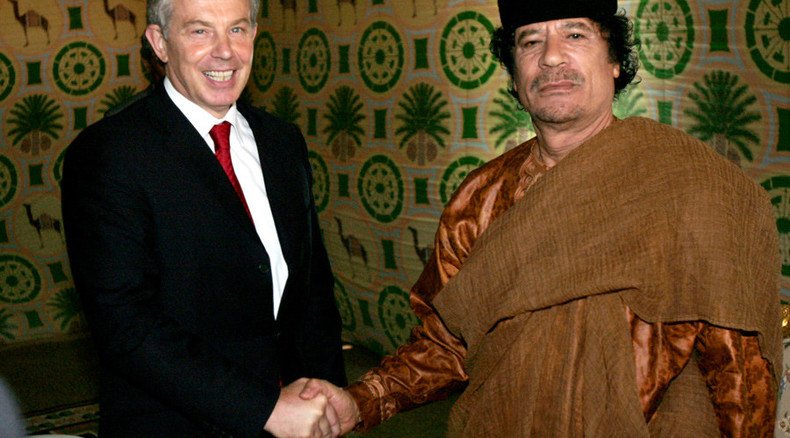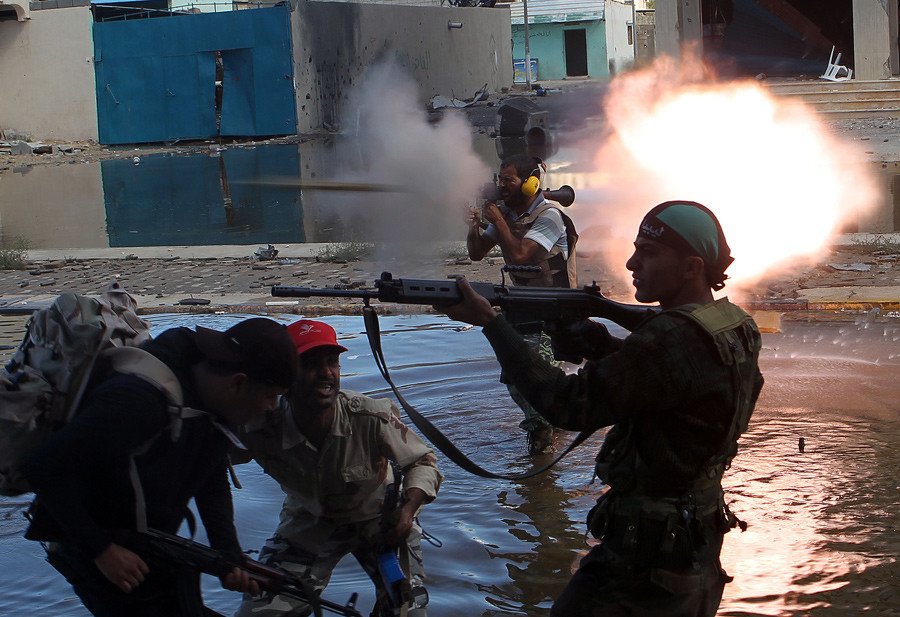Blair urged Gaddafi to step down, flee to safe haven during Libya uprising

Tony Blair encouraged Colonel Gaddafi to flee Libya and find a safe haven as the Arab Spring intensified and rebels raged against his regime, newly released correspondence has revealed.
The ex-Labour prime minister, who presided over Britain’s 2003 invasion of Iraq and its bloody aftermath, urged Gaddafi to find “a safe place to go” as unrest escalated in Libya in 2011.
Blair told Gaddafi that removing himself from his stronghold in Tripoli as part of a “managed” political transition was crucial before the crisis in Libya reached “the point of no return.”
Colonel Gaddafi’s regime had attracted global condemnation at the time, after his security forces opened fire on crowds of pro-democracy protesters. The UN sharply condemned the regime’s brutal crackdown and drew up a resolution against its “gross and systematic violation of human rights.”
Details of Blair’s stealth intervention surfaced after a tranche of emails belonging to ex-US Secretary of State Hilary Clinton were made public under US freedom of information (FoI) laws. The latest disclosure will likely intensify demands for Blair to appear before a public inquiry into UK foreign policy on Libya.
The correspondence included a message from Blair’s strategy chief, Catherine Rimmer, to Clinton’s then-senior advisor, Jake Sullivan, briefing him on a telephone conversation Blair had held with Gaddafi.
Rimmer said Blair had made the call “very privately” and had issued a “very strong message” that the violence had to stop and Gaddafi had to step down, allowing a peaceful political transition to occur.
“The absolute key thing is that the bloodshed and violence must stop,” she quoted Blair as saying.
“If you have a safe place to go then you should go there, because this will not end peacefully unless that happens and there has to be a process of change. That process of change can be managed and we have to find a way of managing it.
“I have talked to people and everyone wants a peaceful end to this.”

Blair reportedly advised Gaddafi he had to make it clear he was prepared to embrace political change and would instruct his forces not to use violence against his own people. The ex-Labour PM also indicated he would intervene with Western powers in a bid to bring about a peaceful resolution to the violence unfolding in Libya at the time.
“The US and the EU are in a tough position right now and I need to take something back to them, which ensures this ends peacefully,” Blair was quoted as saying.
“If people saw the leader standing aside they would be content with that. If this goes on for another day/two days we will go past the point. I’m saying this because I believe it deeply. If we can’t get a way through/out very quickly this will go past the point of no return.”
The following day, the UN Security Council passed a resolution freezing the Libyan dictator’s assets, restricting his travel and referring his regime to the International Criminal Court. Within a matter of weeks, Britain had joined a global coalition that enforced a no-fly zone and naval blockade on the Libyan government, as rebels continued to fight against the regime on the ground.
What is the problem with Blair trying to stop bloodshed and effect change transition? I think he acted honourably. #Blair#Libya#Gadaffi
— The Real Day Today (@TheRealDayToday) October 2, 2015In 2004, Blair acted as a conduit between Gaddafi and the West with his so-called “deal in the desert.” Blair’s supporters maintain the agreement re-opened diplomatic links with the international community, ending Gaddafi’s isolation at the time.
However, Prime Minister David Cameron dismissed these talks as “dodgy deals in the desert” in 2011, after the Gaddafi regime unleashed air attacks and tanks in an attempt to quash the Libyan uprising.
Gaddafi eventually fled Tripoli in August 2011, but was captured and killed the following October during the Battle of Sirte.












